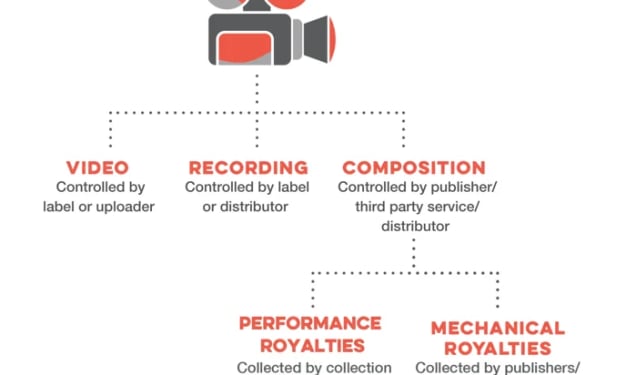A Comprehensive Guide to Music Royalties for Artists
various royalties available in music industry

In the intricate world of the music industry, royalties play a pivotal role in ensuring that artists, songwriters, and producers receive fair compensation for their work. Understanding the different types of royalties is essential for anyone looking to make a sustainable career in music. This comprehensive guide will explore the various royalties available, helping you navigate this complex but crucial aspect of the music business.
Royalties are the lifeblood of the music industry, providing a steady income stream that allows creatives to focus on their art. As music consumption evolves with technology, so does the landscape of royalties. This guide aims to demystify music royalties, breaking down the different types and explaining how they are collected and distributed. Whether you're an independent artist or signed to a label, this knowledge is invaluable for maximizing your earnings and protecting your rights.
Performance Royalties
Performance royalties are earned whenever your music is played in public. This includes radio broadcasts, live performances, and streaming services. Performance rights organizations (PROs) such as ASCAP, BMI, and SESAC in the United States, and SOCAN in Canada, are responsible for collecting these royalties. They monitor the usage of your music and ensure that you receive payment.
For example, if your song is played on the radio, the station logs the play, and the PRO collects a fee from the station. This fee is then distributed to the songwriters, composers, and publishers of the song. To maximize your performance royalties, it’s essential to register your music with a PRO and actively monitor your catalog's usage. Additionally, engaging with international PROs can help you collect royalties from around the world, ensuring that every public performance of your music generates income.
Mechanical Royalties
Mechanical royalties are generated from the reproduction of your music. This includes physical copies such as CDs and vinyl records, as well as digital downloads and streams. In the United States, organizations such as The Harry Fox Agency (HFA) manage the collection and distribution of mechanical royalties. Each time your music is sold or streamed, a mechanical royalty is generated.
For instance, when your song is streamed on platforms like Spotify or downloaded from iTunes, a mechanical royalty is paid. These royalties are typically calculated on a per-unit basis. To ensure you receive mechanical royalties, you must have your music licensed and registered with the relevant agencies. Understanding the different mechanical royalty rates for various platforms can help you strategize your releases and maximize your earnings. By keeping track of your digital and physical sales, you can ensure that all your royalties are accounted for.
Synchronization (Sync) Royalties
Sync royalties are earned when your music is used in synchronization with visual media. This includes films, TV shows, commercials, and video games. Sync royalties can be significant, especially if your music is used in high-profile projects. These deals are usually negotiated directly with production companies or through sync licensing agencies.
For example, if your song is featured in a popular TV show, you will receive a sync fee for the right to use your music. Additionally, you will earn performance royalties each time the show is aired. Sync placements can significantly boost your visibility and income. To increase your chances of landing sync deals, consider working with a music licensing agency that specializes in placing music in visual media. Building relationships with music supervisors can also open up opportunities for your music to be featured in various media projects, providing a lucrative and consistent revenue stream.
Print Music Royalties
Print music royalties are earned from the sale of sheet music. Although this revenue stream is less common today due to the shift towards digital consumption, it remains important for classical and educational music. If your compositions are published and sold as sheet music, you are entitled to royalties from these sales.
For instance, if you create a piano arrangement of your song and it is sold as sheet music, you will earn royalties each time a copy is sold. Print music royalties can also come from instructional books and music anthologies that include your compositions. To capitalize on this revenue stream, ensure your sheet music is available through reputable publishers and online platforms. Additionally, marketing your sheet music to schools, music educators, and libraries can help increase sales and royalties. By providing high-quality arrangements and educational materials, you can tap into a niche but steady market.
Neighboring Rights Royalties
Neighboring rights royalties are collected for the public performance of sound recordings, such as radio and TV broadcasts. These royalties are significant in countries outside the United States. Organizations like PPL in the UK and Re
in Canada manage these royalties. Unlike performance royalties, which are paid to songwriters and composers, neighboring rights royalties are paid to performers and record labels.
For example, if your recorded song is played on the radio in the UK, PPL will collect neighboring rights royalties on your behalf. These royalties are then distributed to the performers and the owner of the recording. To receive these royalties, it is essential to register your recordings with the appropriate organizations in the countries where your music is played. This often involves working with international royalty collection agencies to ensure you receive all the royalties you are entitled to from global performances. Ensuring proper registration and monitoring of your recordings worldwide can help maximize your neighboring rights royalties.
Digital Performance Royalties
Digital performance royalties are paid for the streaming of your music on digital radio services such as Pandora and SiriusXM. In the United States, SoundExchange handles the collection and distribution of these royalties. Unlike mechanical royalties, which are paid per stream, digital performance royalties are paid for the digital transmission of your recordings.
For instance, if your song is played on Pandora, SoundExchange will collect the corresponding digital performance royalties and distribute them to you as the artist, as well as to the record label and other rights holders. To ensure you receive these royalties, you need to register with SoundExchange and make sure that all your recordings are correctly listed in their database. Additionally, monitoring your music’s digital performance and ensuring proper metadata can help you maximize your digital performance royalties. By keeping your digital footprint well-organized and updated, you can ensure that every play and stream is accounted for.
Navigating the world of music royalties can be challenging, but understanding the different types of royalties available is crucial for maximizing your earnings as an artist. By staying informed and ensuring that you are properly registered with the relevant organizations, you can ensure that you receive fair compensation for your work. Each type of royalty—performance, mechanical, sync, print, neighboring rights, and digital performance—offers a unique revenue stream that contributes to your overall earnings.
The music industry is constantly evolving, and staying up-to-date with changes in royalty collection and distribution is essential. Whether you are an independent artist or signed to a label, taking control of your royalty streams can significantly impact your financial stability and career longevity. Remember, every play, download, and sync placement counts, so make sure you are getting the most out of your music. By actively managing your royalties and staying informed about industry trends, you can secure a prosperous future in the music business.
Have you had any experiences with collecting music royalties? Share your insights and tips in the comments below to help others in the music community. Your stories and advice can provide valuable guidance to fellow artists navigating the complex world of music royalties. Let’s create a supportive environment where we can learn from each other and thrive in the music industry together. Engage with this post by sharing your experiences, asking questions, and contributing to the discussion. Your participation helps build a stronger, more informed music community.
About the Creator
Music Industry Updates
Welcome to Music Industry Updates, your go-to hub for the latest happenings in the music world.
Stay tuned, stay informed, and stay inspired with Music Pulse – where every beat counts.
Enjoyed the story? Support the Creator.
Subscribe for free to receive all their stories in your feed. You could also pledge your support or give them a one-off tip, letting them know you appreciate their work.






Comments
There are no comments for this story
Be the first to respond and start the conversation.